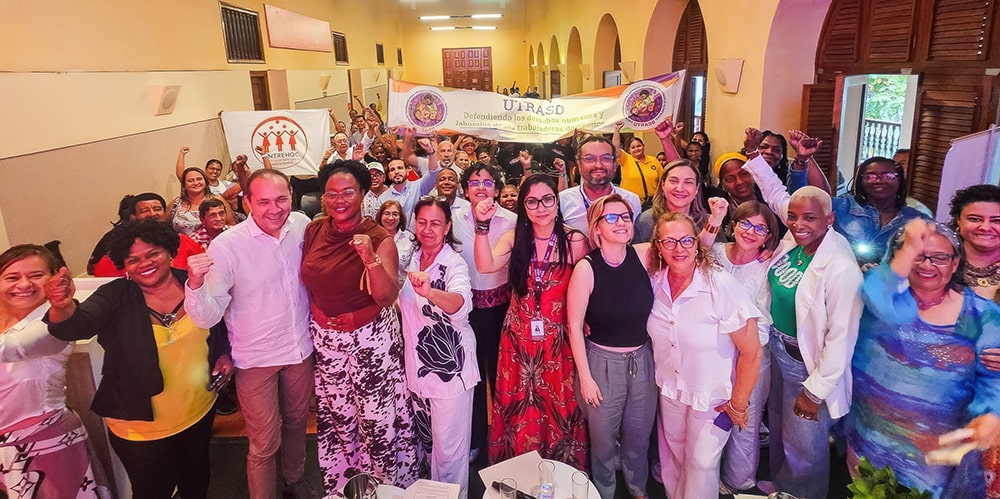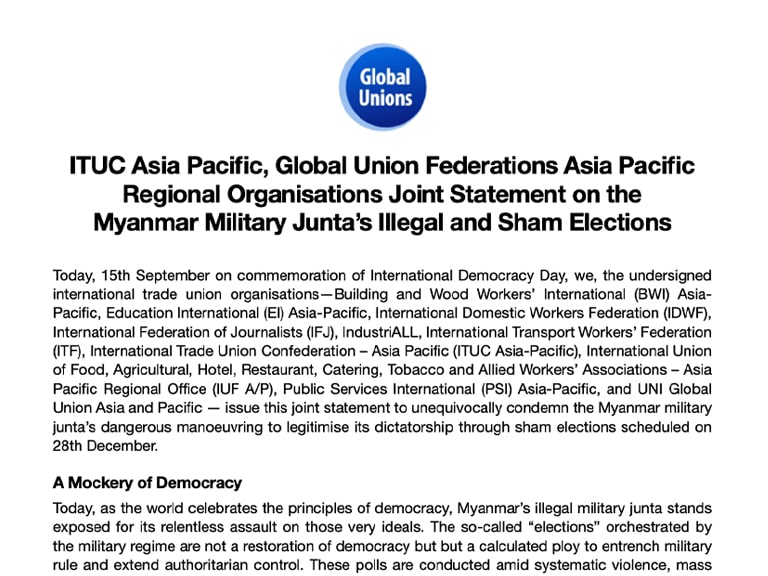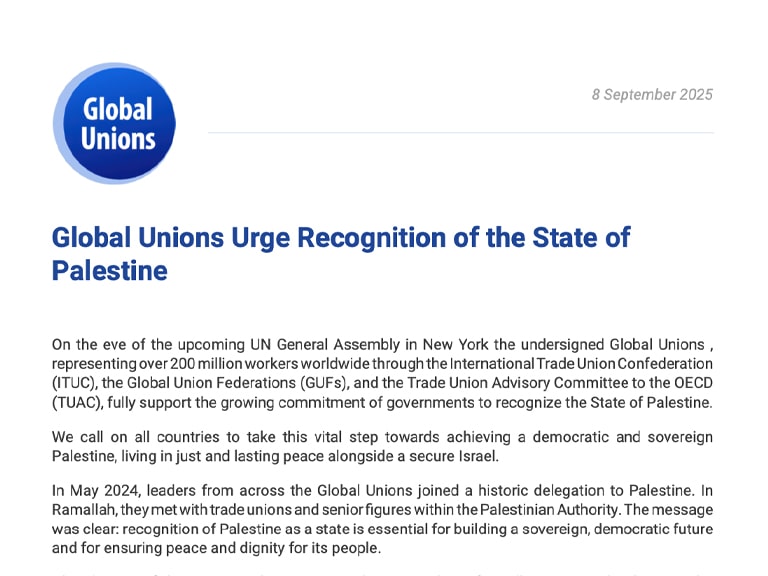
July 25, 2025 marked a turning point for domestic workers in Colombia: The Ministry of Labor issued a resolution establishing collective bargaining for domestic work and creating a Tripartite Dialogue Committee whose agreements are binding on all households that employ domestic workers. It also announced a dedicated line within the Directorate of Labor Inspection and Oversight to safeguard rights and advance formalization in the sector.
These measures are aimed at implementing the domestic work labor reform adopted in June 2025, aligning Colombia’s legal framework with ILO Convention 189 (ratified in 2014). The reform requires all employment contracts to be in writing and registered in a national system, specifying wages, payment method, working hours, rest periods, and days worked. It sets an eight-hour working day and provides for overtime pay, night-work premiums, and severance in cases of unfair dismissal. To curb arbitrary terminations and bolster employment security, repeated renewal of fixed-term contracts must result in conversion to an open-ended contract. Enforcement is strengthened through expanded labor inspections and penalties for non-compliance.
The next step is to establish a negotiating group of domestic worker leaders, who will discuss sector-wide working conditions within the Tripartite Dialogue Committee. The focus now is to move the new labor protections from paper to practice so they translate into tangible improvements in the lives and working conditions of more than 700,000 domestic workers in Colombia—94% of whom are women, the vast majority racialized and from vulnerable communities. Today, 60% earn the minimum wage or less, only 17% have social protection coverage, and 79% are in informal employment.This landmark victory results from the sustained, multifaceted efforts of SINTRASEDOM, UTRASD, and UTRAHOGAR—affiliates of the International Domestic Workers Federation (IDWF), with IDWF’s support. Historically, the failure to recognize domestic work as work—and households as workplaces and employers—has hindered organizing and deprived domestic workers of the traditional fighting tools available to other workers, including collective bargaining and participation in social dialogue. Against this backdrop, the capacity of Colombia’s domestic workers organizations to build collective power and drive change is especially significant.
“This unprecedented achievement reflects the organized work we’ve been carrying out for years. We’ve walked a long path of advocacy, making the most of every space for political participation to raise our voices, to present our demands with solid arguments. In the past, domestic workers were ignored, but now we have a government that listens to us and takes action. This is glorious.”
Claribed Palacios, UTRASD President
A 50-Year Journey from Invisibility to Recognition
The history of organizing by domestic workers in Colombia dates back to 1974, with the creation in Bogotá of Sindicato Nacional de Trabajadoras del Servicio Doméstico — SINTRASEDOM (National Domestic Service Workers Union)—a pioneer in defending domestic workers, including migrants, not only in Colombia but across Latin America, where it was instrumental in the formation of the Confederación Latinoamericana y del Caribe de Trabajadoras del Hogar — CONLACTRAHO (Latin American and Caribbean Confederation of Domestic Workers). In 2012, Unión de Trabajadoras del Hogar Remuneradas — UTRAHOGAR (Paid Domestic Workers Union) was founded, expanding union presence to the key city of Cali. In 2013, Unión de Trabajadoras Afrocolombianas del Servicio Doméstico — UTRASD (Afro-Colombian Domestic Workers Union) emerged in Medellín, grounding its organizing in an intersectional worker identity—race, gender, and class—as a core strategy to confront discrimination, inequality, and abuse in domestic work.
Since the early 2000s, these organizations have maintained a steady agenda to secure recognition of domestic work as work. In 2016, they won passage of Law 1788, establishing the statutory service bonus (“prima de servicios”) for domestic workers. In 2017, the Intersindical de Trabajo Doméstico (Inter-Union Coalition on Domestic Work) began speaking with a common voice to the Government and employers. Building on that foundation, IDWF affiliates have pursued multiple strategies that helped them grow and gain visibility—paving the way for the creation of a bipartite Monitoring Committee on Convention 189 in 2023. Since then, Colombia has made major progress in protecting domestic workers, thereby consolidating Latin America as the leading region on decent work for domestic workers, with 18 ratifications of ILO C189 (out of 39 worldwide) and collective bargaining in four countries: Uruguay (2008), Brazil (São Paulo union, 2013), Argentina (2015), and Colombia (2025).
Turning Strategies into Practice
The remarkable achievements of domestic workers in Colombia are a practical, concrete example of the strategies illustrated in the recently launched IDWF Theory of Change—an innovative framework for action that builds on the movement’s path-breaking history of struggles and victories, turning lessons learned into practice to address today’s care-economy challenges, grow stronger, and make decent work a reality for domestic workers worldwide.
How did domestic workers go from being “unorganizable” to making the unthinkable possible? How did they move from being “voiceless” to having a seat at the table in policymaking spaces?
The feminist premise that the personal is political is put into practice in domestic worker union organizing when it comes to restore dignity, worth, and pride to undo the tangible consequences of intersectional systems of oppression and exclusion that pushed domestic workers to the margins, denying them recognition as “real” workers and the exercise of the rights to which they are entitled. That is why, in 2019, the IDWF launched LUNA School — Leadership, Unity, reNewal and Amplification, a model of transformative leadership centered on strengthening and healing domestic workers’ identity (race, class, gender, ethnicity, caste, migration status). It is no coincidence that leaders from UTRASD, SINTRASEDOM, and UTRAHOGAR in Colombia are graduates of the LUNA program.
Empowered leaders are the foundation of strong, consolidated unions capable of leveraging the symbolic power of the movement and using relational power to open doors to social dialogue, where institutional power is built, driving legal and cultural change. Even in adverse contexts and during crises, domestic workers have responded with resilience and creativity, developing multifaceted strategies to organize, take collective action, and build worker power to win rights, recognition, and visibility.
In the era of care, although the core challenges and aspirations of domestic workers remain, the movement is stepping into a new momentum—one in which they can propose, intervene, and help shape a labor-feminist agenda that positions care as a fundamental pillar of social and economic development. Domestic workers now have a clear vision and a roadmap to make ILO Convention 189 real in law and in practice. And this ultimately advances social, economic, migrant, and racial justice for all.
“When the women that are at the bottom of the socio-economic pyramid rise up to elevate the recognition of their rights, the rest of the women above in the pyramid win, hence domestic workers organizing must be supported and uplifted”.
Adriana Paz Ramírez, IDWF General Secretary






